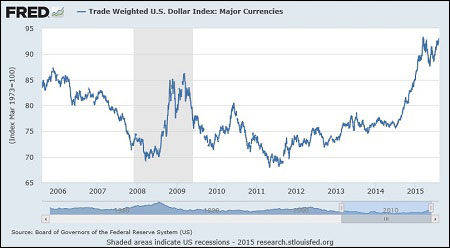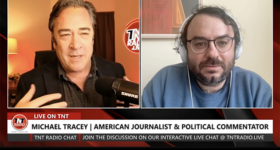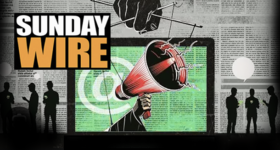21st Century Wire says…
Yesterday, China announced the first devaluation of its Yuan currency in 20 years. This is huge. Undoubtedly, this will have an effect on consumers and investors globally.
First off, this makes it cheaper for Chinese imports coming into the US, Europe and everywhere else. Conversely, this is bad news if you want to export your goods into China. The rest will be argued about profusely by marketeers and financial jocks.
But the harbingers were all there…

It’s important to understand how even US financial history relates to today’s China. The signs were all there last month:
“Against that backdrop, Bloomberg is reporting this morning that 26 percent of stocks trading on mainland China stock exchanges have been suspended from trading. A trading “halt” suggests a temporary measure; a trading “suspension” suggests a much longer-term time frame. Bloomberg goes on to report that the “suspensions have locked up $1.4 trillion of shares.”
The immediate question that comes to mind is that to qualify as a stock market, there has to be a two-sided market. If an investor can’t exit 26 percent of the stocks that are listed on the exchanges, if an investor and the marketplace have no idea where a quarter of the market is priced, is this really still a stock market? The Brady Commission’s use of the word “dysfunctional” to describe one day of trading in 1987 hardly captures the degree of market ruptures in China.
Adding to the mood of desperation on the part of Chinese authorities, the Financial Times is reporting that journalists in China have been told that they are no longer allowed to report on suicides by “equity citizens,” the catchphrase used in China to describe retail stock investors. Retail investors now make up 80 to 90 percent of the Chinese stock market, according to the Financial Times. They are heavily margined, just as the unsophisticated retail investors were in the U.S. market crash of 1929. And in a further similarity to 1929, where the guys shining shoes were giving out hot stock tips to their customers, the Wall Street Journal reported yesterday that a Chinese woman had invested on a tip from her hairdresser. Yesterday evening, CNBC described an Uber taxi driver in China who was trading from his car.”
Now for the full breakdown…
What China’s Devaluation Means to the U.S. Economy
.
Pam Martens and Russ Martens
Wall Street on Parade
Markets received a seismic jolt from China on Tuesday as it devalued its currency, the Yuan, by the most in two decades, cutting its daily reference rate by 1.9 percent. The move sparked instant selloffs in stocks, commodities, and emerging market currencies as well as a drop in the yield of the 10-year U.S. Treasury Note, which is trading early this morning at a yield of 2.16 percent.
The devaluation was interpreted in the markets as a sign of capitulation by China to forego a stable currency policy in a last-ditch effort to revitalize sluggish export growth. On Friday, China reported that its exports had plunged by 8.3 percent overall in July with dramatic declines of 12.3 percent to the European Union and 13 percent to Japan. Exports to the United States fell by 1.3 percent.
While China announced that the currency devaluation was a one-off move, the prevailing fear in global markets is that it marks a new round in the raging currency wars where countries are now competing to debase their currencies in hopes of making their exports more competitively priced in global markets.
The move spells trouble for the U.S. on a number of fronts. As of 8:39 a.m. in New York, stock futures on the Dow Jones Industrial Average were in the red by 147 points.
The U.S. imports more goods from China than any other country. Through June of this year, the U.S. had imported $226.7 billion in goods from China versus $150.4 billion from Canada and $145.1 billion from Mexico, according to the U.S. Census Bureau. The Federal Reserve has been struggling to avoid importing deflation into the U.S.; this devaluation move now means that Chinese goods flowing into the U.S. just got cheaper and the ability of U.S. exporters to compete in global markets just got a lot harder.
According to a Federal Reserve report released on July 17, the rising value of the U.S. Dollar is having a significant negative impact on large U.S. based multinationals. The report noted that “The dollar’s strength likely explains roughly a third of the recent decline in profits earned from foreign subsidiaries” and that “Firms with high foreign sales tend to be larger and account for almost 75 percent of S&P 500 nonfinancial earnings excluding oil and utilities.”
As we have reported before, this global currency race to the bottom cannot be solved by central banks. The problem is directly rooted in the unprecedented levels of income and wealth inequality that plague this era. In the U.S., that problem springs directly from Wall Street’s institutionalized wealth transfer system.
President Franklin D. Roosevelt explained the causes of the Great Depression as follows. President Obama would be wise indeed to heed these words.
“…our basic trouble was not an insufficiency of capital. It was an insufficient distribution of buying power coupled with an over-sufficient speculation in production. While wages rose in many of our industries, they did not as a whole rise proportionately to the reward to capital, and at the same time the purchasing power of other great groups of our population was permitted to shrink. We accumulated such a superabundance of capital that our great bankers were vying with each other, some of them employing questionable methods, in their efforts to lend this capital at home and abroad. I believe that we are at the threshold of a fundamental change in our popular economic thought, that in the future we are going to think less about the producer and more about the consumer. Do what we may have to do to inject life into our ailing economic order, we cannot make it endure for long unless we can bring about a wiser, more equitable distribution of the national income.”
READ MORE CHINA NEWS AT: 21st Century Wire China Files














